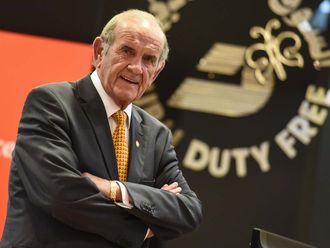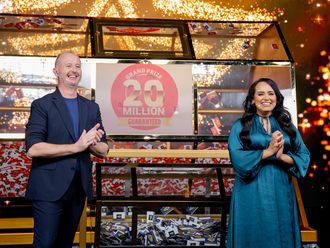
My guilt at skipping off to the theatre with my husband and leaving our children with the babysitter was justified. On our return, we were informed that the 5-year-old had pushed the 3-year-old off the sofa. The 3-year-old — realising he could not match his sibling in strength — had relieved himself in a bucket, then chucked the contents over his brother's head. "This," said the critical voice in my head, "is what you get for pursuing your own frivolous needs at the expense of your darlings."
Well-meaning but fallible
And yet, secretly, I felt proud. What intelligence they showed. What resourcefulness. And while I would never claim delight in a slosh of urine being tipped over my dear eldest boy, there was a faint, satisfying belief that he had learnt a lesson, one which, had I been there roaring "Don't fight!", would have passed him by.
And so I, and every well-meaning but fallible parent, is rejoicing at the news that by leaving children to their own devices while we enjoy ourselves as a couple, we are enriching their lives, a theory advanced by the publication of To Raise Happy Kids, Put Your Marriage First by the American family therapist David Code.
Code believes that by suffocating children with attention while neglecting the relationship with our partner, we stifle their development. "Families centred on children create anxious, exhausted parents and demanding, entitled children," he says. "We parents are too quick to sacrifice our lives and our marriages for our kids. A good marriage sets a great example for your children's future relationships and that's win-win for the whole family.''
Set good examples
Indeed, we are so terrified of being selfish adults that we have forgotten that just setting a good example is what creates a rounded, successful, happy human being — surely all we want for our children. It is not the child who plays tennis and speaks Italian who is set for a fabulous life, if her mother can't be civil to her father.
Frank Furedi, professor of sociology at the University of Kent and author of Paranoid Parenting, says: "Children's security and their sense of wellbeing is inseparable from how they view the two people they have the most amount of confidence and trust in — their father and their mother — and if that relationship seems harmonious and happy, it can act as a source of inspiration and security for that child.''
Even Michelle Obama manages a weekly "date night'' with her better half. I don't manage that in my marriage and I'm sure the Obama schedule is busier than ours. It's as if we fear that, were we to allow ourselves one night off at a restaurant a deux while the kindly Romanian cleaner lets the kids run riot, the next weekend we would be jetting off to Ibiza, leaving the toddler squalling in his cot with a bottle of Coke.
Break to reboot
Unlike me, economist Simone Sultana, mother of Misha, 11, and Maya, 6, understands the concept of balance. She describes the odd long weekend away with her husband as "rebooting". "It completely changes how we cope with the more relentless parts of parenting and keeping a home functioning," she says. "It's important for my son and daughter to see that their mum and dad are more than their parents and want to do things together because they love each other and are good friends.''
Sultana's children are lucky enough to have a young grandmother who can look after them regularly — which removes another consideration: the financial cost of enjoying yourselves as a couple while out of the house. But before you book the babysitter, psychiatrist Oliver James wants a word. He is aghast at the title To Raise Happy Kids, Put Your Marriage First and doesn't believe that "out of the house" is necessary. If you wish to demonstrate to your children that you enjoy a healthy, happy relationship with your spouse, he believes it is enough for them to witness your "points of contact". (These can include having jokes together or listening to music in the car together.) When I confess that my husband and I have never had a weekend away from our children (the eldest is now 7), James says: "I think you are right to be careful. Even at the age of 7 or 8, if their relationship with the carer isn't that close, it can be traumatic. Children are more likely to be mentally healthy and have happy lives if they have close relationships with their parents and their parents are there."
He is only assuaged when I assure him that the children have a close relationship with their grandparents. Sue Palmer, author of Toxic Childhood, is in favour of letting go. "The way that children have been raised in all cultures from time immemorial is that the parent gives them an enormous amount of attention in the early years but after that, the child is handed into the extended family and the community."
Give them space
Our reluctance to trust our children to build relationships with other children and other adults, to allow them to learn from their mistakes without mummy hot on their heels, is damaging. If we present ourselves as anxious, convinced of their imminent doom, we create neurotic children who have no self-esteem, no faith in themselves or their ability to do anything.
And yet, I know my children thrive in the loving care of their grandmothers. And when I dress up to go out with their father, those little boys are in awe. It really is that simple and silly — I see their delight and excitement reflected in my own.
I am foolish to be so surprised, for, as Furedi says: "Children expect their mothers and fathers to be independent human beings and often take great pride in their parents' achievements. One of the best ways of getting your child to do something is by personal example. My son is good at sports and one reason is that my wife swims every morning and I go to the gym three or four times a week. Kids pick up on how parents live their lives.''
Time management is key
This, he says, sends a far more powerful sign than, say, forcing your child to take tennis lessons if he only ever sees his parents sprawled on the sofa. Sue Palmer quotes the Swedish child development expert Anna Wahlgren, who says children should be "in the centre of a marriage, not the centre".
Palmer says: "Sometimes the focus will be on the children and sometimes on your partner. We have to find ways of recognising that you can't do it all, you've just got to do the best you can.''










